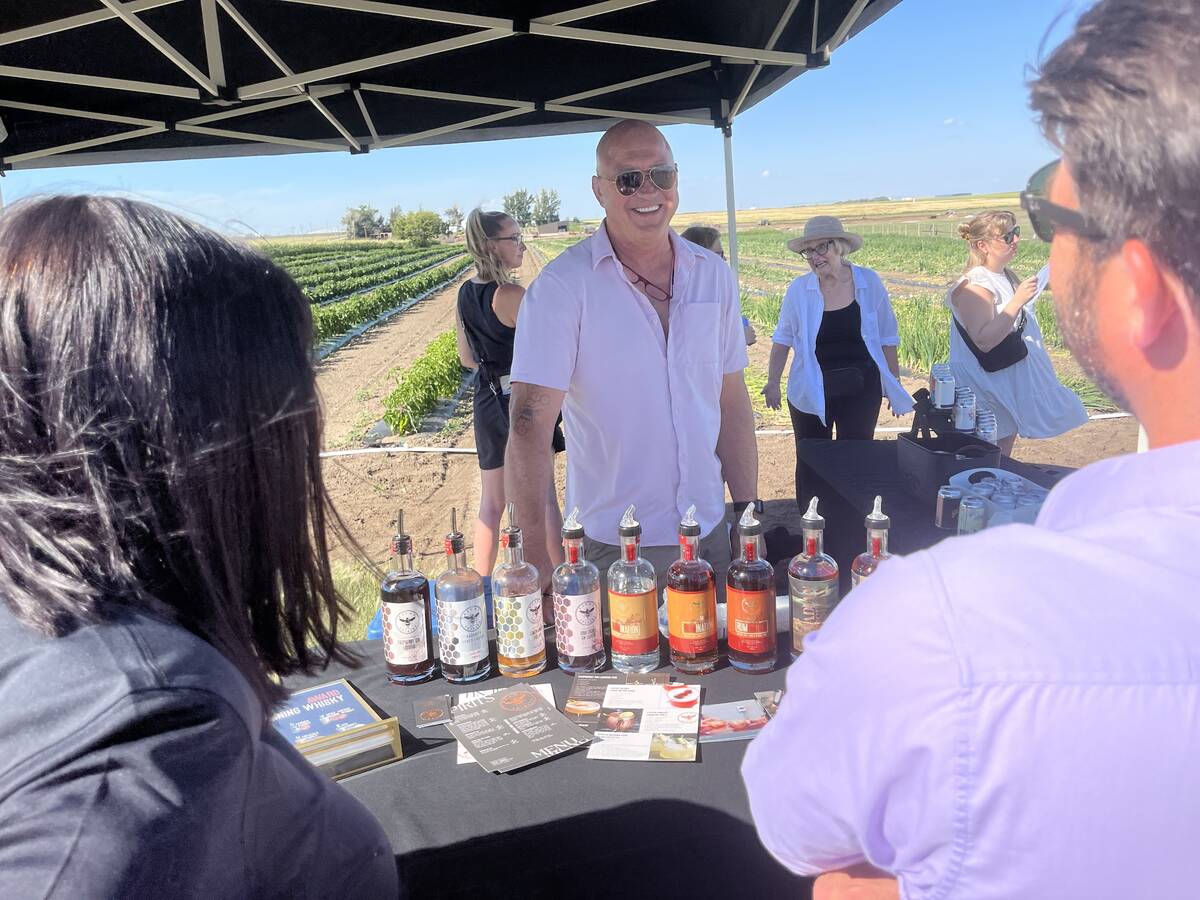AUSTIN, Man. – From the road there are few hints of the innovations taking place at the farm of Lyndon and Laurelly Beswitherick.
The garden that supplies produce for farmers’ markets is blanketed under snow, with only a few sunflower plants jutting out. The building that houses their store is inconspicuous and overshadowed by a nearby barn. Aside from a couple of horses, there is no evidence that livestock helps support this farm.
But a visit with the Beswithericks soon reveals that their farm has undergone a dizzying amount of change. Cropping and livestock are part of that effort, but direct marketing of farm products also has become a mainstay.
Read Also

From farmer to award-winning distiller
Pivot Spirits showcases transition from farmer to distiller with provincial award-winning results in Alberta for Lars Hirch
“It took two years to find out what sells and what doesn’t,” said Laurelly, describing her experience marketing garden produce.
“And just because it sells doesn’t mean it always makes you money.”
When the Beswithericks married 10 years ago, they agreed that their income would come from farming, without the help of off-farm jobs.
With that ambition in mind, they seldom have shied from making changes to their farm. Many of those changes have taken place in the past four years, following their decision to leave dairy farming and to emphasize cropping and beef cattle production.
“It wasn’t much of a decision,” Lyndon said. “We were sick of milking the cows.”
Lyndon and Laurelly were farming in partnership with his parents until four years ago. When his parents decided to retire from farming, he and Laurelly had the chance to buy full ownership of the dairy and possibly expand it.
They considered that option, but knew it would require a large commitment of time and money. Unable to convince themselves that an expanded dairy would bring much benefit, they instead chose to sell their dairy quota and cows and to invest in more cropland and an expansion of their feedlot.
“To us, it just seemed to make a lot more sense,” said Laurelly, seated at the kitchen table where many of the family’s decisions about farming are made.
However, the Beswithericks had no way of knowing that the following year would bring BSE in an Alberta cow and throw the beef industry into tumult. The discovery of BSE stalled exports of Canadian beef and live cattle. It also shook beef cattle markets and left many producers grasping at ways to survive.
For the Beswithericks, survival included selling vegetables from their garden and marketing their beef directly to consumers.
Part of their inspiration came from a direct farm marketing conference in Ontario in February 2004. In recognition of being named Manitoba’s outstanding young farmers the previous year, the Beswithericks were sent to the conference by the Canadian Farm Business Management Council.
“We came out of there just full of all sorts of ideas,” said Laurelly.
“That just kind of gave us the extra push to carry on.”
The Beswithericks began sending cattle to be slaughtered and processed at a provincially inspected abattoir in Gladstone, Man. The beef was cut and wrapped there, but the Beswithericks needed to store the beef in freezers at their farm and find markets for it.
In Manitoba, the biggest potential market is Winnipeg, and that is where Lyndon and Laurelly turned their efforts. They made their first deliveries of beef there in the spring of 2004.
They were able to establish a regular clientele and are paid a premium for their beef, based on its quality and an ability to provide customers with a history of how their cattle are raised from birth through to finishing. The Beswithericks keep close records on things such as vaccinations given to their cattle and what their livestock is fed.
“We decided we were not going to do it for cheap,” said Laurelly. “We were targeting people that wanted really good, top quality meat.”
Their direct marketing efforts continue to flourish. Besides selling beef and garden produce, they also have found demand for gift baskets and bouquets of cut flowers. The gift baskets include chocolates made by the Beswithericks and an assortment of food products made by farm entrepreneurs in Manitoba. Pasta, maple syrup, honey, soup mixes and a pancake mix made with flax are among the assortment of products featured.
Stepping over a snowdrift created by a recent storm, Lyndon leads the way into the store on their farm. It holds a freezer for storing their beef and also houses shelving where the gift baskets and numerous made-in-Manitoba products are featured. The store was once the office for the dairy. It was renovated and approved by a government inspector for food distribution.
“People don’t realize they can get everything they need from within Manitoba,” Laurelly said, describing the foods grown and processed in the province. “And it wouldn’t be any more expensive.”
The Beswithericks continue to operate a feedlot, which is located away from their yard site. They grow a diversity of crops, including oats and sunflowers destined for human consumption.
One of their latest purchases was an air seeder. It’s part of an ongoing effort to limit the amount of tillage on their fields, conserving soil and moisture while also reducing fuel costs and wear and tear on their machinery.
Lyndon also wants to include more alfalfa in his rotations to improve the soil while reducing fertilizer costs. He said any land that is sub-par for cropping will be seeded to forages.
“Just because you bought grain land, doesn’t mean it’s going to stay grain land.”
One of their ambitions is to increase their farm income without buying more land. Direct farm marketing will be an important part of that effort.
The Beswithericks have three daughters: Heather, 7, Shaelyn, 5, and Megan, 2. The girls have a keen interest in the farm animals and as they become old enough, they are getting involved in the gardening and trips to craft sales and farmers’ markets.
Lyndon’s father and a neighbour help shoulder part of the farm work. Lyndon and Laurelly appreciate that help, since they also make room on their calendar for community involvement, including the church and rodeo. They both are on the executive this year for the Manitoba Outstanding Young Farmers program.
The irony is that the Beswithericks often are working seven days a week, despite citing that as one of the reasons for leaving the dairy industry. They seem to thrive on their work, however, and they view farming as the ideal setting for raising a family.
“You don’t think about it,” said Lyndon, when asked how they manage their workload.
“You just do it,” added Laurelly, summing up their determination to continue with a way of life that has deep roots on both sides of their family.














